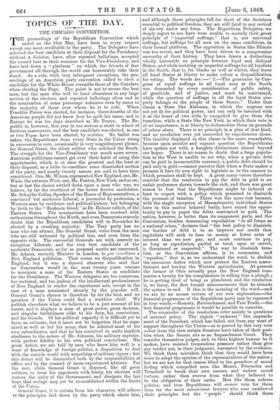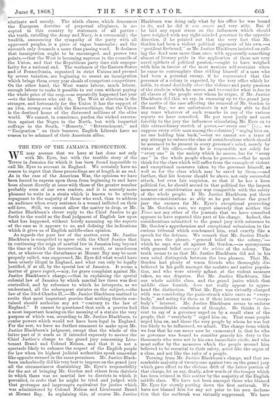TOPICS OF THE DAY.
THE CHICAGO CONVENTION.
THE proceedings of the Republican Convention which ended on the 21st May, have been in every respect except one most creditable to the party. The Delegates have selected the best candidate at their disposal for the Presidency without a division, have, after repeated ballotings, accepted the second best as their nominee for the Vice-Presidency, and have laid down a " platform " on which the friends of free government all through the world can honourably take their stand. As a rule, with very infrequent exceptions, the pro- ceedings of an American party convention called to elect a candidate for the White House resemble those of the Conclave when electing the Pope. The point is not to secure the best man, but the man who will be least obnoxious to any large section of the electors, and repeated ballotings often end in the nomination of some personage unknown even by name to the majority of those over whom he is to rule. When Franklin Pierce was elected, for instance, three-fourths of the American people did not know how he spelt his name, and in Europe he was for days described as Mr. Pearce. The Re- public is, however, this year in too serious a strait to admit of factious manoeuvres, and the best candidate was elected, as one or two Popes have been elected, by acclaim. No ballot was taken, the Republicans from every State in the Union rising in succession to vote, occasionally in very magniloquent phrase, for General Grant, the silent soldier who subdued the South. The struggle for the Vice-Presidency was much more severe. American politicians cannot get over their habit of using this appointment, which is at once the greatest and the least at their disposal, as a bribe to conciliate some dissatisfied section of the party, and nearly twenty names are said to have been considered. One, Mr. Wilson, represented New England, one, Mr. Wade, the extreme West, one, Mr. Fenton, New York, and so on; but at last the choice settled down upon a man who was, we believe, by far the worthiest of the better known candidates. Mr. Schuyler Colfax,Speaker of the House of Representatives, a convinced but moderate Liberal, a journalist by profession, a Western man by residence and political history, but belonging by birth to the " Brahmin blood," as Dr. Holmes calls it, of the Eastern States. The nominations have been received with enthusiasm throughout the North, and even Democrats scarcely doubt that the Republican candidates will in November be elected by a crushing majority. The Tory party has no man who can attract, like General Grant, votes from the men who are still unbound by political ties, and even from the opposite side. The successful Generals are with scarcely an exception Liberals, and the very best candidate of the moderate Democrats, as far as personal merits are concerned, Mr. Adams, recently Minister in London, is par excellence a New England politician. That seems no disqualification in England, but it was a shrewd observer who said that no Convention would in the next twenty years venture to nominate a man of the Eastern States as candidate for the Presidency. The Western delegates are too numerous, too sectional, and too jealous of the intellectual predominance of New England to render the experiment safe, except in the case of a man nominated already by the popular will. General Grant's chance is therefore by far the best, and we question if the Union could find a worthier chief. We publish elsewhere what we believe to be a just account of his career, and it displays a man of great power, great decision, and singular faithfulness alike to his duty, his convictions, and his friends. Of his political capacity it is difficult yet to form an estimate, but it must not be forgotten that he orga- nized as well as led his army, that he selected most of his own subordinates, and that he has contrived to unite implicit obedience to the orders of Mr. Johnson, his military superior, with perfect fidelity to his own political convictions. His great defect, we are told by men who know him well, is a want of knowledge of foreign politics, a disposition to deal with the outside world with something of military rigour ; but this defect will be diminished both by the responsibilities of office, and by the counsel of more experienced advisers. For the rest, while General Grant is disposed, like all great soldiers, to treat his opponents with lenity, his election will restore the unity of the Government, and dissipate the last hope that serfage may yet be re-established within the limits of the Union.
General Grant, it is certain from his character, will adhere to the principles laid down by the party which elects him, and although those principles fall far short of the doctrines essential to political freedom, they are still fatal to any revival of slaiery under any form. The Republican Delegates, we deeply regret to see, have been unable to embody their great principle of " impartial suffrage," that is, not universe/ suffrage, but suffrage for all men on the same conditions, in their formal platform. The opposition in States like Illinois was too severe, and they have been driven to a compromise- unworthy of their history. They have drawn a distinction wholly untenable on principle between loyal and disloyal States, and while insisting on impartial suffrage for all loyalists in the South, that is, for blacks as well as whites, they leave- all loyal States at liberty to make colour a disqualification for voting. The words are :—" 2.—The guarantee by Con- gress of equal suffrage to all loyal men at the South was demanded by every consideration of public safety, of gratitude, and of justice, and must be maintained, while the question of suffrage in all the loyal States pro- perly belongs to the people of those States." Under that clause a State like Alabama, in which the negroes are not yet fit for political power, and can only be invested with it as the lesser of two evils, is compelled to give them the franchise, while a State like New York, in which their vote is of no importance, is at liberty to disfranchise them on grounds. of colour alone. There is no principle in a plan of that kind, and no revolution ever yet succeeded by expediencies alone. The timidity displayed in this clause is the more remarkable, because upon another and cognate question the Republicans have spoken out with a haughty distinctness almost beyond our hopes. There is no reason to doubt that a large popula- tion in the West is unable to see why, when a private debt can be paid in inconvertible currency, a public debt should be paid only in gold,—cannot perceive that when a State makes a promise it bars its own right to legislate as to the manner in which promises shall be kept. A great many voters therefore consider that the resolution to pay the debt in gold is an unfair preference shown towards the rich, and there was great reason to fear that the Republicans might be induced at least to covet with a policy which promised to diminish the pressure of taxation. There was the more fear because, with the single exception of Massachusetts, individual States. have in this matter behaved badly, have seized the oppor- tunity to pay in paper the debts contracted in gold. The nation, however, is better than its component parts, and the Convention, besides denouncing repudiation " in all forms as a national crime," declares that " the best policy to diminish, our burden of debt is to so improve our credit that capitalists will seek to loan us money at lower rates of interest than we now pay, and must continue to pay, so long as repudiation, partial or total, open or covert, is threatened or suspected." The way to diminish taxa- tion, as the Convention affirms, is to economize, and " equalize," that is, as we understand the word, to abolish the enormous duties which now protect the Eastern manu- facturer and burden the Western agriculturist. At present the farmer of Ohio actually pays the New England iron- master a bounty for his complaisance in selling him a plough ; he is getting tired of being so plundered, and the resolution is, we fancy, the first formal announcement that he intends. the system to end. If this is the meaning of the word—and we are by no means certain of our own explanation—the financial programme of the Republican party may be expressed in four words,—Honesty, Retrenchment, and Free Trade,—the best financial programme it would be possible to conceive.
The remainder of the resolutions refer mainly to questions of internal policy. The eighth " endorses " the impeach- ment of the President, which has failed, not from any want of support throughout the Union—as is proved by this very vote —but from the view certain Senators have taken of their posi- tion when the Senate sits as an Impeachment Court. They consider themselves judges, and, to their highest honour be it spoken, have resisted tremendous pressure rather than give any verdict not, in their judgment, warranted by the evidence. We think them mistaken, think that they would have been wiser to adopt the opinion of the representatives of the nation ; but we are not for that reason blind to the grandeur of moral feeling which compelled men like Messrs. Fessenden and Trumbull to break their own careers and endure moral torture, rather than swerve from what they believed to be the obligation of their oaths. Men like them redeem politics, and true Republicans will sooner vote for them than for the most subservient lawyers who ever swallowed their principles lest the "people " should think them
obstinate and unruly. The ninth clause, which denounces the European doctrine of perpetual allegiance, is ac- cepted in this country by statesmen of all parties ; the tenth, extolling the Army and Navy, is a ceremonial ; the -twelfth, announcing the sympathy of the party with all oppressed peoples, is a piece of vague buncombe ; and the eleventh only demands a more than passing word. It declares tkat immigration ought to be encouraged, and proves two points,—that the West is becoming supreme in the councils of the Union, and that the Republican party dare risk unpopu- larity for a national end. The workmen of the Eastern States and of Pennsylvania, organized in strict Unions and pressed by severe taxation, are beginning to resent an immigration which brings them every year shoals of competent competitors. On the other hand, the West wants labour, much labour, enough labour to make it possible to cut corn without paying the whole price of the crop,—as repeatedly happened last year —to the labourers who cut it. The West at elections is the stronger, and fortunately for the Union it has the support of an idea, strong even with the linownothings, that the Union is the destined home of the distressed millions of the older world. We cannot, in conscience, pardon the wicked reserva- tion against the Negro in the North, but with impartial suffrage in the South, "Honesty," "Retrenchment," and " Emigration " on their banners, English Liberals have no reason to be ashamed of their American allies.



































 Previous page
Previous page